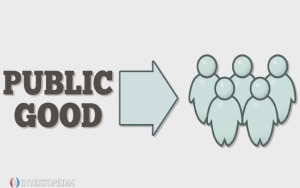Public Good Definition is Weird.
So, I want to first mention that it appears that we are using the term “public good” VERY loosely. I think a lot of us may have a wrong idea of what public good is, based on the definition. There are few public goods: clean water, national defense, and a few others are mentioned on the wikipedia page for “pubic good”. Therefore, I feel like considering a company’s public good initiative is very flawed, as I don’t think any company can really give us that other than homeland defense or the environmental protection agency.
Now, I do feel like public good used loosely can go a lot of ways. A company might have a public good initiative that isn’t necessarily free/accessible to EVERYONE or completely non-competitive, but there are a bunch of companies who are committed to doing good in their local community. Again, I think that those two things are very different, and easy to confuse, but I also think it is really important to see the difference.
So, I actually don’t want to give the name of any of the companies I’m talking about, as 1) I am applying for jobs in these companies, and 2) this also applies to a LARGE number of companies I’ve seen…not just these. So, forgive my vagueness, but I feel very uncomfortable with my name associated on the internet with these companies.
Several companies I have applied for in the last month have initiatives to do good in the community. Three companies in the RDU area that I have applied for have on their websites, linkedin profiles, and job descriptions that they offer paid time off for their employees to do volunteer work at a local non-profit or volunteer service. They offer days off for this, and two of the companies that I applied for even REQUIRE their employees to take off a certain number of hours a year to do some sort of community service. They also work closely and donate time and money to certain local organizations, which I think is great.
Now, I can see that this isn’t necessarily a “good”, BUT if we look in terms of people’s labor as a “good”, these companies are offering and encouraging free (for the community) service many times with skilled workers. This is greatly beneficial to the local community, and considering the wide array of charities around this area, many different types of people can access this help. The company’s goal is to give back to their local communities. Two of the three companies I applied for are huge companies, while one is a smaller, local company, so it’s quite a scale that do these things. I think our generation is doing well in focusing on more humanitarian goals that the previous ones. These are all profitable, and successful companies.
I really can’t answer how these companies get big data, and I also don’t really see how that applies to public good. Perhaps they collect the names of organizations that their employees are working with to find where needs in the community lie.
I would say for example, one of the companies I am looking at has 500 local employees (estimated). If everyone is required to take even just a day off, they are doing a LOT of good in the community.

 Previous Post
Previous Post Next Post
Next Post
I had no idea companies could require their employees to do community service. That a really interesting concept and I could see this being a major benefit to a local community. It raises several questions however, are these part of the work hours, or is this something done outside of that time? Is the company paying for your services and finding a cause for you to help with or is the community service in the more literal sense that you have to keep track of? It’s just as cool of an idea as it is, I could see a lot of people quitting over having to perform tasks that they weren’t expected to be doing.
I don’t know about people quitting for having to do community service. I imagine that these companies that push community service hours are hoping it boosts employee satisfaction, recruitment, or company image. Not to say that their intentions in promoting community service are 100% profit driven, but I think they could see community service as a win-win option. I wonder what data is out there regarding required volunteer work and employee satisfaction. There must be some
Also, completely agree with you on the definition of good. I think we’ve been talking about both things that are public goods and about the public good
I am with you and Raj in that I think the definition of good and what is a public good is something that people tend to bend and twist. (I know I had to think about the definition for my post about Pure Barre…) Anyway, I think that is one of the most important factors in trying to decipher what a company stands for. Obviously companies have to establish initiatives to do good or else they’re basically completely invalid. But it is really interesting to consider how just because a company wants to output some kind of good does not at all mean that it is a company for the public good. And when big data falls into play here, I almost think that a company can’t claim to be for the public good because it clearly wants to use big data for a more selfish purpose.
Thinking about what “public good” means is important, and was definitely difficult for us even as presenters. Let’s say a company only contributes about 1% of its wealth and time to pursuing a public interest, but still affects a large number of people that way. Just because the company is for-profit or otherwise uses the big data it collects doesn’t mean that their efforts aren’t for the public good in at least some aspects. In other words, “company that contributes to the public good” and “profit-driven corporation” are not mutually exclusive. Similarly, “collecting data and using it for a positive initiative” and “using that same data to help drive profits” are not mutually exclusive, either. Just like people, companies aren’t necessarily all good or all greedy – sometimes, they fall somewhere in the middle. That doesn’t mean their good initiatives should be discounted.